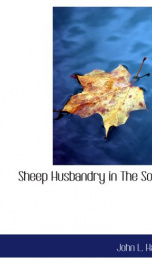sheep husbandry in the south

Purchase of this book includes free trial access to www.million-books.com where you can read more than a million books for free. This is an OCR edition with typos. Excerpt from book: Culture of Electoral Wools recommended. There is likely to be no more appropriate place than in this connection to speak of a class of wools whose culture has almost ceased in this country, and has greatly declined throughout the world. We refer to the exceedingly fine electoral wools, such as were formerly produced by the old Saxon sheep, and at present by the Silesian sheep of the same or a very similar race. They are still cultivated, to a limited extent, in Silesia, Hungary, and Poland, which countries produce all the superfine wools used in Europe. The few wools of this class used here are imported from these countries, at enormous prices. Fashion, invariably revolving in great cycles, always repeats herself in time. Superfine broadcloths, and other tissues demanding the finest fibre, will again be in vogue. The electoral wools will secure prices, as they have never yet done, proportionate to their high cost of production. On account of the delicacy of the animals producing them, these wools cannot be successfully grown at the North; as we know personally from observation on the paternal farm in Maine, where their culture was formerly attempted with the utmost energy, but with such poor results as to cause their abandonment. In the mild climate of the South, their successful culture is assured beyond all question. This is proved by the letter last quoted. Mr. Watts, of South Carolina, in his communication elsewhere given at length, says: " I have now on my table a Silesian wool, measuring, say, 1,800 hairs to the inch, which cost the consumer here one dollar and fifty cents in gold per pound. With none of the ridiculously extreme care which the European growers of the electoral wool exercise in their flocks, Mark Cockerill, of Tennessee (near Nashville), has raised Sax... --This text refers to an alternate Paperback edition.
Info about the book
Author:
Series:
Unknown
ISBN:
0896723062
Rating:
3.5/5 (4)Your rating:
0/5
Languge:
English
Users who have this book
Users who want this book
What readers are saying
What do you think? Write your own comment on this book!
write a commentif you like sheep husbandry in the south try:
Other books by this author
Do you want to exchange books? It’s EASY!
Get registered and find other users who want to give their favourite books to good hands!

